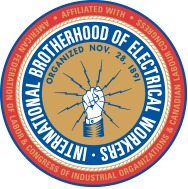The importance of political relationships was evident in Alberta in December, when Edmonton Local 424 officials helped persuade the provincial government to squash a plan to import construction workers from the United Arab Emirates.
“Employers have used programs like these to drive down wages and working conditions in construction,” said Assistant Business Manager Scott Crichton, a leader in the battle. “It’s never been a good way to fill worker shortages.”
A Local 424 business agent based in Calgary attended a November meeting of signatory contractors and noticed the government’s plan on the agenda. At that point, no details had been made public.
That information was passed to Crichton and Business Manager Mike Reinhart. They immediately realized the threat it posed to Local 424 members.
Alberta’s unemployment rate was 7.9%, fourth-highest of Canadian provinces, and less than 50% of Local 424’s construction members were fully employed. Its executive committee unanimously approved Reinhart’s request to send Local 424 representatives, including Crichton, to the Canadian Labour Congress’ annual Lobby Day on Parliament Hill in Ottawa in late November.
Once there, they met with MPs Heather McPherson (Edmonton Strathcona) and Charlie Angus (Timmins James Bay) from the New Democratic Party, traditionally the country’s most pro-worker party. They agreed to help and sent a letter of protest to the federal minister of employment.
Local 424 was able to schedule a meeting with provincial officials to discuss the issue Dec. 5. It was postponed until Dec. 11.
In the meantime, the CBC posted a story to its website Dec. 6 about the program, which the provincial government said in documents was a way to attract workers who were extensively vetted and could speak English. The initiative was tentatively scheduled to start in February or March.
The CBC also noted that Local 424 had more than 4,000 members in Alberta and the Northwest Territories, many ready to work in construction maintenance, which the foreign workers were supposed to address.
“If there are issues related to meeting skilled labour demands, we want to be part of that conversation,” Crichton told the CBC. “We want to be involved with any consultation the government does. … We have a lot of electricians ready to go to work.”
A spokesperson for Premier Danielle Smith said she was unaware of the plan.
“For them to propose bringing in these foreign workers when these IBEW workers are already available was just a ridiculous statement,” Reinhart said.
Two days later, the provincial government, which is ruled by Smith’s United Conservative Party, announced that it was changing course, and the program was scrapped.
“It was great that those in the know saw this was something worth reporting,” Reinhart said of the CBC’s story.
Human rights advocates have noted that imported foreign workers usually receive little of what they are promised, no matter the country. They often deal with unsafe conditions and substandard pay compared to native-born workers.
That was another reason to fight the initiative, Crichton said.
“We stand against bringing vulnerable people into our province and exposing them to conditions workers should not be exposed to,” he said.
Battling anti-union initiatives is nothing new for Local 424. Alberta is the only province where a company can legally engage in “double breasting” — where it operates both union and nonunion employee units to drive down wages.
But Reinhart and Crichton said they remain hopeful that the province will work with Local 424 to address any skilled-worker shortage. Smith visited the local and its training center earlier in 2024.
“We built a little rapport while she was visiting,” he said.
Crichton said the executive committee’s quick approval of Reinhart’s request to send representatives to Ottawa was crucial.
“It’s further proof that lobbying does work,” he said. “You just have to find the right people to talk to on Parliament Hill at the right time.”
This article was originally published in the February 2025 issue of The Electrical Worker.



